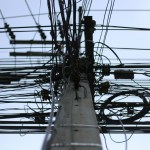News
Human rights organisation Liberty has won a court case against the Investigatory Powers Act (IPA), AKA the Snoopers’ Charter, which allows UK security agencies near unfettered access to telecoms data
Back in 2016, the UK government introduced the IPA, defining and in many cases expanding the electronic surveillance powers of the British intelligence agencies, including Secret Intelligence Service (SIS or MI6), the Security Service (MI5), the Government Communications Headquarters (GCHQ) and Defence Intelligence.
Quickly nicknamed the Snoopers’ Charter by the media, the IPA allowed the state security agencies to monitor the publics’ private communications and personal information, largely regardless of whether they suspect wrongdoing. This information is accessed via the nation’s telecoms operators and can take the form of telephone records, texts, location data, and internet browser history.
Naturally, this Act was highly controversial and, in 2017, the human rights organisation Liberty launched a crowd-funded legal challenge against the Act.
Liberty argued that the UK’s bulk surveillance powers granted by the IPA are incompatible with EU law (which the UK government had decided to retain post-Brexit), saying that there were insufficient safeguards in place and that data could be retained and accessed regardless of its relevance to national security. They also argued that the powers do not comply with parts of the European Convention on Human Right, particularly with regards to journalistic communications.
Now, two High Court judges have ruled in favour of Liberty, agreeing that the security services unilateral access to private telecoms data is illegal.
The judges ruled that these agencies should be forced to apply for a warrant from the secretary of state before exercising bulk surveillance powers. The Office of the Investigatory Powers Commissioner and the Investigatory Powers Tribunal should also play roles in overseeing the process, the court said.
“The court has agreed that it’s too easy for the security services to get their hands on our data. From now on, when investigating crime, MI5, MI6 and GCHQ will have to obtain independent authorisation before having access to our communications data,” said Liberty lawyer, Megan Goulding.
The court further ruled that intelligence services should be subject to the same safeguards as the police when it came to legally gathering surveillance data.
“When the security and intelligence agencies act for an ordinary criminal purpose, we cannot see any logical or practical reason why they should not be subject to the same legal regime as the police,” said the court in its judgement.
However, the ruling did not go entirely Liberty’s way, with the court dismissing the group’s claims that the IPA did not provide sufficient safeguards for journalistic material and sources. It also ruled against Liberty’s claim that the IPA permits ‘indiscriminate and generalised’ data collection and therefore requires increased safeguards.
Liberty said that they would apply to appeal these and other points.
These qualms aside, the ruling represents a significant step in what Liberty calls the “fight against mass surveillance”.
“Mass surveillance powers do not make us safer, they breach our privacy and undermine core pillars of our democracy. Today represents a huge landmark in reining in mass surveillance powers, and we hope now the Government creates proper safeguards that protect our rights,” said Goulding.
Are UK telecoms operators doing enough to protect their customers personal data? Find out from the operators at this year’s live Connected Britain event
Also in the news:
Orange targets digital divide with new digital skills centre in Brussels
Australian businesses connected in days not weeks
Startup Stories: The Belle of Belfast City
Orange targets digital divide with new digital skills centre in Brussels
Australian businesses connected in days not weeks
Startup Stories: The Belle of Belfast City
















